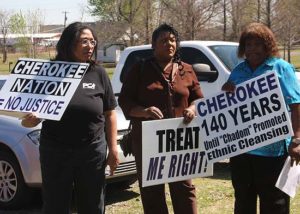
Marilyn Vann, (far left), a Cherokee Freedmen, called the judge’s ruling nothing short of “groundbreaking.” (Image courtesy of Blog Spot).
After a 40-year battle, the descendants of enslaved Blacks who were once owned by the Cherokee Nation — also known as Cherokee Freedmen — have finally been granted tribal citizenship, thanks to a federal court ruling out of Washington, D.C. this week.
U.S. District Judge Thomas F. Hogan ruled Wednesday, Aug. 30, that Cherokee Freedmen have citizenship rights, settling the longstanding dispute between the Freedmen and the second-largest tribe in the U.S.
“The Cherokee Nation can continue to define itself as it sees fit,” Hogan wrote in his ruling. “But [it] must do so equally and evenhandedly with respect to native Cherokees, and the descendants of Cherokee Freedmen … their fates under the Cherokee Nation Constitution rise and fall equally, and in tandem.”
Following emancipation, an 1866 treaty signed between the Tahlequah, Oklahoma-based Cherokees and the U.S. government granted the tribe’s freedmen “all the rights of Native Cherokees,” according to the Smithsonian’s National Museum of the American Indian. But in 2007, the tribe amended its constitution to make “Indian blood” a requirement for citizenship.
As a result, nearly 2,800 Freedmen were stripped of their membership.
NPR reported that the U.S. government opposed the tribe’s vote to expel the Freedmen and their descendants. At one point, the U.S. Department of Housing and Urban Development even cut $37 million in funding to the Cherokee Nation as a result.
For Marilyn Vann, president of the Descendants of Freedmen of the Five Civilized Tribes, Wednesday’s decision is nothing short of “groundbreaking.”
“There can be racial justice, but it doesn’t always come easy,” Vann, who also is one of the plaintiffs in the case, told NPR. “What this means for me is the Freedmen people will be able to continue our citizenship … and also that we’re able to preserve our history. All we ever wanted was the rights promised us to continue to be enforced.”
In a separate statement, Vann said, “Going forward, I am hoping that the tribe will come together and we can just be Cherokees, Cherokee people and not freedmen … and maybe we can become the most powerful tribe in the entire country.”
Under the judge’s ruling, Cherokee Freedmen would be afforded all the rights that Native Cherokees have, including the right to vote in elections, run for office and receive health care and housing benefits, the Associated Press reported.
Todd Hembree, the tribe’s attorney general, said in a statement Thursday that the Cherokee Nation doesn’t plan to appeal the decision.
“While the U.S. District Court ruled against the Cherokee Nation, I do not see it as a defeat,” Hembree wrote. “As the Attorney General, I see this as an opportunity to resolve the Freedmen citizenship issue and allow the Cherokee Nation to move beyond this dispute.
“My office will work tirelessly to thoroughly review this decision and its legal ramifications, and will move forward in a way that best serves the interests of the Cherokee Nation and its citizens, including Freedmen descendants.”


